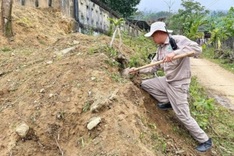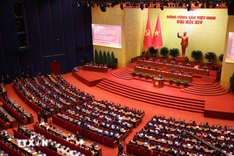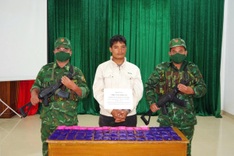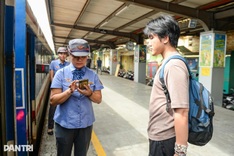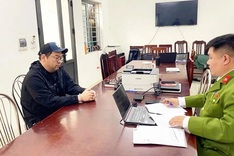Vietnam’s education has been described as the “read and write down” education (lecturers read lectures, students write down on their notebooks), which is believed to stifle the creative capacity of learners.
 |
“Should I write down what I think in my mind, or should I simply copy from textbook?”, a third grader named Phuong Nga in Hanoi stated when he was preparing for the ethics exam the next day.
The boy raised the question, because though he wanted to write what he thought, he would get higher marks, if he simply copies from the textbook.
During lesson hours, teachers read, students write down
“The “read and write down” teaching should be seen as a passive method, which kills the creativeness of learners, because there is no interaction between lecturers and learners,” Le Hai Yen from the Hanoi University of Education wrote in her report, about how to encourage children’s creativeness.
The teaching method in which teachers impose their viewpoints on learners is really a blunder. Deputy Prime Minister Nguyen Thien Nhan, in a letter to leaders of 63 cities and provinces sent earlier this academic year to urgently call on to stop the “read and write down” teaching method.
Nevertheless, despite the calls by the state’s leaders and the efforts educators, the problematic teaching method is still being used at grammar schools. In lesson hours, teachers still read lectures, while students simply write down what they hear from teachers.
Educating children based on adult’s purpose
The answer that Nga gave to her son was “It’s up to you”. With the answer, Nga did not want to impose her viewpoint on his son, but gives the boy the right to make decisions.
However, in fact, the boy would not have another choice than writing down the exam papers the things he learned from textbooks and heard from teachers, if he wanted to get good marks. Nga and other parents also do not have other choices other than accepting the current situation of Vietnamese education.
Le Tue Minh, Director of WellSpring, an international school, related that she received a letter from a parent after the school opening. In the letter, the parent complained that the school subjects in Vietnam prove to be dry and rigid, while Vietnamese education attaches special attention to the learning results. Therefore, the parent thinks that it is really difficult for teachers to generate creation to help students get excited in studying.
“What I am concerned most of is, that the education is not provided based on the children’s demand, but on adults’ purpose,” Minh said.
He went on to say that advanced teaching methods are the ones which allows to equip students with the capability to think and use knowledge in reality, the capability to take actions and solve problems. Teaching does not mean simply providing as much English or mathematics knowledge as possible.
A lot of things that are not really useful for children have still been taught; while necessary life skills have not been provided. Providing knowledge has been prioritized in the education, while physical training and feeling education have been disregarded.
Why are the curriculums too heavy for students? Why is so many useless knowledge still put into textbooks? Nguyen Ke Hao, former Director of the Primary Education Department under the Ministry of Education and Training said: “When writing books, authors all want to show that they have deep knowledge, therefore, they try to put as much knowledge as possible into the textbooks”.
Heavy curriculums can explain why students always complain about the heavy burden put on their shoulders. A recent survey has found out that students have to use too many textbooks in lessons. Many students were found as going to school with the schoolbags weighing nearly five kilos.


